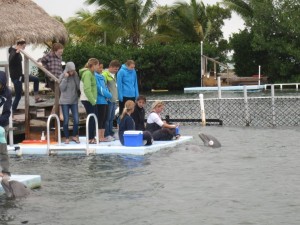Another study that we observed this week was the blindfolded imitation study. The aim of this study was to see whether dolphins could imitate another dolphin when their sense of sight was taken away. This was done using silicone eye cups that would easily suction over the subjects eyes. One eye cup was removed and the subject was given the hand signal to “imitate”. The second eyecup was then replaced. The other dolphin was then silently signaled to do a random behavior. The researchers avoided doing behaviors that would endanger a sightless dolphin (ie. out of water dives, etc.). The trial was considered a success if the blindfolded dolphin correctly imitated the second dolphin’s behavior. The trail was considered a failure if the blindfolded dolphin did not correctly imitate the second dolphin’s behavior.
We got to experience this study first-hand by assisting trainer Jane with a demonstration with dolphins AJ and Tanner. In our demonstration, Tanner was blindfolded with the eyecups. We were able to silently signal AJ to perform a behavior, while the trainer signaled Tanner to imitate. In the majority of trials, Tanner was successful at imitating AJ while blindfolded, consistent with the DRC’s published article “Blindfolded Imitation in a Bottlenose Dolphin” (Tursiops truncatus)” (2010). How did he do this? He used passive listening and echolocation. This was determined in the blindfolded imitation study by performing the trials in the presence of underwater microphones, called hydrophones. To confirm the use of echolocation and passive listening, rather than communication between blindfolded and sighted dolphins, the DRC also had Tanner imitate human movements in water while blindfolded, which would eliminate the possibility that dolphins were communicating. Similar to previous trials, Tanner successfully imitated human movements while blindfolded. From this demonstration and corresponding study, we learned that dolphins have the capability to problem solve when their sense of sight is removed to imitate another subject. It was a great experience!
By: Claire Kittock and Anna Olson


